|
De Vlaamse schrijver Henri (Hendrik) Conscience werd geboren in Antwerpen op 3 december 1812. Zie ook alle tags voor Hendrik Conscience op dit blog.
Uit: Wat eene moeder lijden kan
“Het was uitermate koud in de laatste dagen der maand Januari 1841. De straten der stad Antwerpen hadden haar winterkleed aangenomen en glinsterden van zuivere witheid; de sneeuw viel echter niet bij zachte vlokken, noch verheugde het oog met hare duizend dooreenspelende pluimkens; integendeel, zij viel kletterend en als hagel tegen de vensterglazen der geslotene huizen, - en de bittere noorderwind joeg de meeste burgers, die zich op hunnen dorpel vertoonden, terug naar de gloeiënde kachel.
Niettegenstaande de bitsigheid der koude, en alhoewel het slechts negen ure in den morgen was, zag men, mits den Vrijdag, vele personen voorbijgaan. De jonge lieden poogden zich door loopen te verwarmen, de goede burgers bliezen grimmend in de vingeren en de werklieden sloegen zich met geweld de armen om het lichaam.
Op dit oogenblik ging er eene vrouw vrij langzaam door de Winkelstraat, welker inwoners zij wel moest kennen, daar zij uit en in de arme huizen ging, en deze telkens met eene uitdrukking van genoegen verliet. Een satijnen mantel, die gewis met watten gevuld was, bedekte hare fijne leden, een fluweelen hoed drukte haar zwierig hoofd en hare wangen, die een weinig door de zure lucht verpurperd waren; eene boa omslingerde haren hals, en hare handen verborgen zich in eene fraaie moffel. Deze juffer, die genoegzaam rijk scheen, bevond zich op den dorpel van een huis, in hetwelk zij gereed stond om binnen te treden, toen zij eensklaps in de verte eene andere juffer harer kennis zag aankomen; zij bleef bij de deur der arme woning staan, totdat hare vriendin haar nabij was; dan ging zij haar met eenen gullen lach te gemoet, en sprak haar aldus aan:
‘Eenen goeden dag, Adela. Hoe gaat het?’
‘Tamelijk wel, en met u?’
‘God zij dank, ik ben gezond en zoo verheugd dat ik het u niet zeggen kan.’
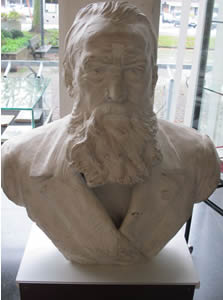
Hendrik Conscience (3 december 1812 – 10 september 1883)
Borstbeeld in Sint-Niklaas
De Brits-Poolse schrijver Joseph Conrad werd geboren op 3 december 1857 in Berdichev, Rusland in een gezin met Poolse ouders. Zie ook alle tags voor Joseph Conrad op dit blog.
Uit:Heart of Darkness
“The voice of the surf heard now and then was a positive pleasure, like the speech of a brother. It was something natural, that had its reason, that had a meaning. Now and then a boat from the shore gave one a momentary contact with reality. It was paddled by black fellows. You could see from afar the white of their eyeballs glistening. They shouted, sang; their bodies streamed with perspiration; they had faces like grotesque masks--these chaps; but they had bone, muscle, a wild vitality, an intense energy of movement, that was as natural and true as the surf along their coast. They wanted no excuse for being there. They were a great comfort to look at. For a time I would feel I belonged still to a world of straightforward facts; but the feeling would not last long. Something would turn up to scare it away. Once, I remember, we came upon a man-of-war anchored off the coast. There wasn't even a shed there, and she was shelling the bush. It appears the French had one of their wars going on thereabouts. Her ensign dropped limp like a rag; the muzzles of the long six-inch guns stuck out all over the low hull; the greasy, slimy swell swung her up lazily and let her down, swaying her thin masts. In the empty immensity of earth, sky, and water, there she was, incomprehensible, firing into a continent. Pop, would go one of the six-inch guns; a small flame would dart and vanish, a little white smoke would disappear, a tiny projectile would give a feeble screech--and nothing happened. Nothing could happen. There was a touch of insanity in the proceeding, a sense of lugubrious drollery in the sight; and it was not dissipated by somebody on board assuring me earnestly there was a camp of natives--he called them enemies!--hidden out of sight somewhere.
"We gave her her letters (I heard the men in that lonely ship were dying of fever at the rate of three a day) and went on. We called at some more places with farcical names, where the merry dance of death and trade goes on in a still and earthy atmosphere as of an overheated catacomb; all along the formless coast bordered by dangerous surf, as if Nature herself had tried to ward off intruders; in and out of rivers, streams of death in life, whose banks were rotting into mud, whose waters, thickened into slime, invaded the contorted mangroves that seemed to writhe at us in the extremity of an impotent despair. Nowhere did we stop long enough to get a particularized impression, but the general sense of vague and oppressive wonder grew upon me. It was like a weary pilgrimage amongst hints for nightmares.“
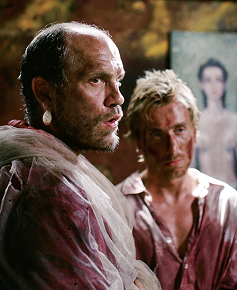
Joseph Conrad (3 december 1857 – 3 augustus 1924)
Scene uir de tv-film met Tim Roth (Marlow) en John Malkovich (Kurtz), 1993
De Nederlandse schrijver Herman Heijermans werd geboren op 3 december 1864 in Rotterdam. Zie ook alle tags voor Herman Heijermans op dit blog.
Uit: Op hoop van zegen
“jo, door linkse deur - bruin voorschoot - rooi-ijzers aan de zwarte handen
Dàg juffrouw.
kniertje, nijdig.
De kippe zijn los! De haan zit op Ari z'n dak.
jo, vrolijk-lachend
Hahaha! Dáar zal-ie toch geen eiere legge!
kniertje
Hoor haar! En nou wéet ze dat 't laatst op vechte af is geweest omdat ze in z'n aardappelveld liepe!
jo
'k Heb ze zèlf losgelate, ouwe brombeer - Truus het gister gerooid.
kniertje
Zeg 't dan dadelijk.
jo
Nee maar, wat doe ik nou ànders? O, juffrouw - die wordt alleen mens as ze gromme kan. 's Nachts as ze slaapt knort ze nòg hardop. Van nacht het ze in d'r droom gevlóékt! Hahaha! Nou maar je màg! Snauw jij maar, hoor! Je ben toch 'n goeie ouwe!
Tot Barend die binnenkomt.
Ach stumper! Zit de haan op 't dàk? En wil-ie 'r niet afkomme?
barend
Nou - schei uit!
jo
Wedde dat as je met de kippies vrijt - de haan jaloers wordt en vanzelf na benee tippelt? Hahaha! Hij ziet 'r wit van!”
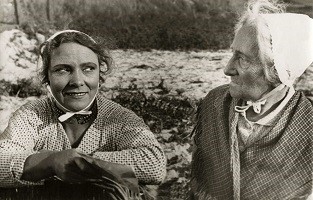
Herman Heijermans (3 december 1864 – 22 november 1924)
Scene uit de film met Annie Verhulst (Jo) en Esther de Boer- van Rijk (Kniertje), 1924
De Amerikaanse dichteres en schrijfster Grace Andreacchi werd geboren op 3 december 1954 in New York. Zie ook alle tags voor Grace Andreacchi op dit blog.
Uit: A Night On The Town
“When the Doctor blew into town he phoned right away, as I knew he would, his cool, boarding-school drawl tickling my ear. ‘You’ve got to let me show you the town,’ he said. I knew better than to argue with him. It was early summer and the lilacs were blooming in vacant lots all over the city, in the overgrown bomb craters and on the edges of building sites where the cranes growled and bit great holes into the earth all day long. But we met in the peaceful twilight, just outside the U-Bahn at Savigny Platz. ‘You’re looking good,’ said the Doc, from behind his dark glasses. He sounded surprised. I was wearing a black dress, a little Audrey Hepburn number I keep for such indiscernible occasions, and a lot of pearls, some of them real, white gloves. ‘Come on,’ he said, taking my arm forcefully. ‘I want to show you a thing or two.’
We went to a literary café and sat under the chestnut trees’ heavy odorous blooms, we ordered white wine and small, pink and green sandwiches. The Doctor, voracious as usual, and I waiting for some invisible signal before I could eat, drinking the cold wine slowly but not carefully, clinking the pearls, my small globules of personal moonlight, upon the marble table. ‘I missed you,’ said the Doctor. He said the people in China were very appreciative of his sixteen string violin, which struck me as a good thing. ‘What’ve you been up to?’ he said, raising those eyebrows of his.
‘I go to the opera a lot,’ I said. ‘Nearly every night.’
‘Still with the opera singer?’ he said. I shrugged and looked at the thick, waxy chestnut flowers falling into my plate. I wasn’t going to talk about that to him. Very slowly, the darkness was closing in, first pale blue, then violet, then a warm, even blackness you could almost stroke.
We went to a club where they stamped small spidery characters on our hands. Inside the air was the colour of winter twilight over snow, a jazz band was playing very loud music that made my eyes hurt. ‘Can I get you a drink?’ said the Doctor. I said I’d have a Mineralwasser. ‘You can’t have water in a place like this,’ he said. Disapproving stare over the top of those glasses. ‘I can have whatever I like,’ I said. This is what it’s like to be a beautiful woman – you can have whatever you like, at least in the drinks department. The Doctor was drinking absinthe again. ‘Can you get me some pills?’ I said.”
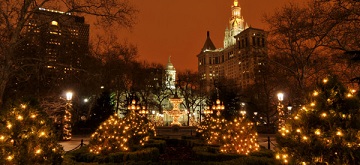
Grace Andreacchi (New York, 3 december 1954)
Manhattan, New-York, in de adventstijd
De Italiaanse schrijver Ugo Riccarelli werd geboren op 3 december 1954 in Turijn. Zie ook alle tags voor Ugo Riccarelli op dit blog en ook mijn blog van 3 december 2010..
Uit: Der Zauberer (Vertaald door Karin Krieger)
„Von der Kurve, die gleich hinter dem Bahnhof ihres Dörfchens begann, nahm ein Zug eines Tages die Leben von jungen Burschen mit sich fort, die Uniform trugen, das Gewehr geschultert, wie man es ihnen bei den Appellen im faschistischen Samstagsdienst beigebracht hatte, auf halbem Weg zwischen Krieg und Kirchweih. Auf den Bänken sitzend oder ausgestreckt, noch gefangen zwischen dem Zweifel an dem bevorstehenden Triumph und der leisen Angst vor der Ferne, richteten die jungen Soldaten ihren Blick einmütig auf meinen Vater und baten ihn und sein Gauklertalent wortlos, sie auf dieser Reise zum Gold und in die Finsternis an die Hand zu nehmen.
Er spürte diese Blicke auf sich, die steinernen Blicke von Leuten vom Land, von Menschen, die es vermochten, vor den majestätischen, schroffen Bergen dieser Gegend zu wohnen, Leben und Blut aus dem Boden zu ziehen, aus dem schweren Schlamm im Winter und aus dem Staub im Sommer. Spröde, wortkarge Leute zumeist, die ihre Träume lieber begruben, als dass sie vor aller Welt kundtaten, dass sie am Leben waren, die ihre Träume lieber im Wein ertränkten, in Flüchen erstickten und in dem mit nur einem Axthieb zerteilten Holz. Er spürte die Blicke auf sich und begriff, dass neben dem Lokomotivführer, der wahrscheinlich wusste, wohin die Reise ging, in diesem Zug wirklich er der einzige war, der eine Idee von dem Afrika hatte, das die Regierung ihnen beschert hatte, er, der an diese Idee nie geglaubt hatte.
So kam er zwischen dem Rattern des Stahls und dem Knarren der Holzbänke zum x-tenmal der Pflicht nach, die seine magischen Kräfte ihm auferlegten, und begann dieser Truppe zu erzählen, wie die Berber ihre entzückenden Fohlen zureiten und wie der Mond nachts in der Wüste vor Kälte weint, die der Sand ihm zurücksendet, nachdem die Sonne jeden Atemzug verbrannt hat. Er beschrieb ihnen das Aroma von Sandelholz, den Hibiskus, die Häuser aus Sand und den Schnitt der Frauenaugen, den man hinter hauchdünnen Schleiern nur ahnen konnte.“
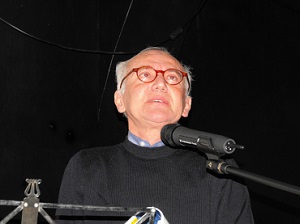
Ugo Riccarelli (Turijn, 3 december 1954)
De Sloveense dichter en schrijver France Prešeren werd geboren op 3 december 1800 in Vrba. Zie ook alle tags voor France Prešeren op dit blog en ook mijn blog van 3 december 2010.
A Wreath of Sonnets (14/14)
Fresh flowers will spread fragrance far and near,
Like roses when the winter's passed away,
And spring displays its marvellous array,
While through the trees white scattered blossoms peer.
The bees hum in the air sun-drenched and clear,
The shepherd's up by golden break of day,
Loud trills the nightingale on many a spray -
All nature is aglow with joyful cheer.
I know I scarce deserve such bliss; my mind
Is full of dread that you may still disdain
These poems or be vexed by them again.
Let them at least some little favour find
With you; to ease by it his bitter pain,
A Slovene wreath your poet has entwined.
Vertaald door V. de Sola Pinto
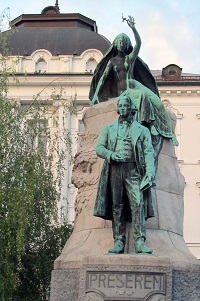
France Prešeren (3 december 1800 – 8 februari 1849)
Standbeeld in Ljubljana
De Filipijnse schrijver F. Sionil José werd geboren op 3 december 1924 in Rosales, Pangasinan. Zie ook alle tags voor F. Sionil José op dit blog en ook mijn blog van 3 december 2010.
Uit: The Pretenders
“She had tried reading the books from the shelf by their bed-some anthologies, journals, and pocketbooks that her husband always had close by, but her mind could not latch on to anything she could retain. She stood up and, noticing the torn bits of paper with which her husband had littered the floor, started picking them up out of curiosity more than anything, and read the old, yellowed pages of the book that they had brought back from the Ilocos. It was in Latin and, of course, she did not understand. Then, as if she remembered that these bits of paper were important, she scooped them up and placed them in the shoe boxes that lined one of the closets in the room. The work tired her a little but still sleep would not come. For the first time, she was afraid that Tony Samson would never return, that when he said good-bye the parting was permanent, as final as death itself.
When she did fall asleep it was almost light and the east was already gray. She slept briefly but well, and when she woke up she immediately missed the arm that was usually flung across her breast, the warm nearness of a body she had known.“
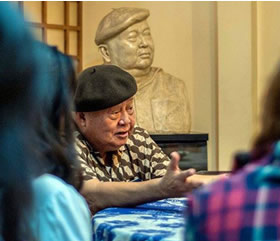
F. Sionil José (Rosales, 3 december 1924)
Zie voor nog meer schrijvers van de 3e september ook mijn blog van 3 december 2011 deel 1 en eveneens deel 2.
03-12-2014 om 15:00
geschreven door Romenu 
Tags:Hendrik Conscience, Joseph Conrad, Herman Heijermans, Grace Andreacchi, Ugo Riccarelli, France Pre¨eren, F. Sionil José, Romenu
|

